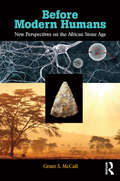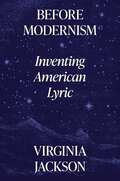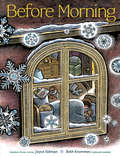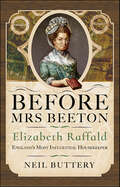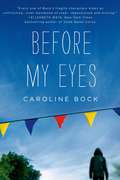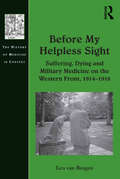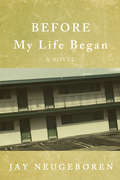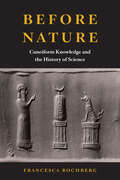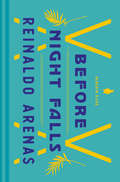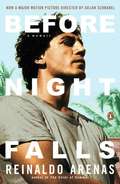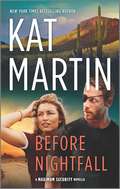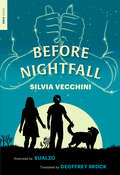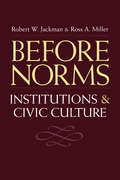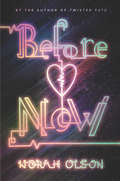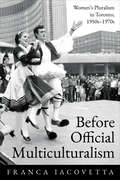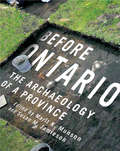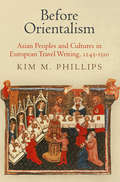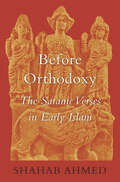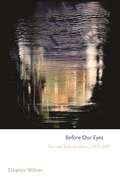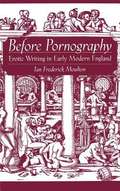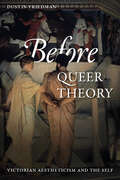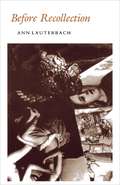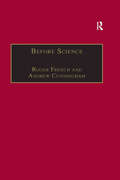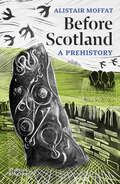- Table View
- List View
Before Modern Humans: New Perspectives on the African Stone Age
by Grant S. McCallThis fascinating volume, assessing Lower and Middle Pleistocene African prehistory, argues that the onset of the Middle Stone Age marks the origins of landscape use patterns resembling those of modern human foragers. Inaugurating a paradigm shift in our understanding of modern human behavior, Grant McCall argues that this transition—related to the origins of “home base” residential site use—occurred in mosaic fashion over the course of hundreds of thousands of years. He concludes by proposing a model of brain evolution driven by increasing subsistence diversity and intensity against the backdrop of larger populations and Pleistocene environmental unpredictability. McCall argues that human brain size did not arise to support the complex patterns of social behavior that pervade our lives today, but instead large human brains were co-opted for these purposes relatively late in prehistory, accounting for the striking archaeological record of the Upper Pleistocene.
Before Modernism: Inventing American Lyric
by Virginia JacksonHow Black poets have charted the direction of American poetics for the past two centuriesBefore Modernism examines how Black poetics, in antagonism with White poetics in the late eighteenth and early nineteenth centuries, produced the conditions for the invention of modern American poetry. Through inspired readings of the poetry of Phillis Wheatley Peters, George Moses Horton, Ann Plato, James Monroe Whitfield, and Frances Ellen Watkins Harper—as well as the poetry of neglected but once popular White poets William Cullen Bryant and Henry Wadsworth Longfellow—Virginia Jackson demonstrates how Black poets inspired the direction that American poetics has taken for the past two centuries. As an idea of poetry based on genres of poems such as ballads, elegies, odes, hymns, drinking songs, and epistles gave way to an idea of poetry based on genres of people—Black, White, male, female, Indigenous—almost all poetry became lyric poetry. Jackson traces the twisted paths leading to our current understanding of lyric, along the way presenting not only a new history but a new theory of American poetry.A major reassessment of the origins and development of American poetics, Before Modernism argues against a literary critical narrative that links American modernism directly to British or European Romanticism, emphasizing instead the many ways in which early Black poets intervened by inventing what Wheatley called “the deep design” of American lyric.
Before Morning
by Joyce Sidman Beth KrommesThere are planes to fly and buses to catch, but a child uses the power of words, in the form of an invocation, to persuade fate to bring her family a snow day — a day slow and unhurried enough to spend at home together. In a spare text that reads as pure song and illustrations of astonishingly beautiful scratchboard art, Sidman and Krommes remind us that sometimes, if spoken from the heart, wishes really can come true.
Before Mrs Beeton: Elizabeth Raffald, England's Most Influential Housekeeper
by Neil ButteryThe great Elizabeth Raffald used to be a household name, and her list of accomplishments would make even the highest of achievers feel suddenly impotent. After becoming housekeeper at Arley Hall in Cheshire at age twenty-five, she married and moved to Manchester, transforming the Manchester food scene and business community, writing the first A to Z directory and creating the first domestic servants registry office, the first temping agency if you will. Not only that, she set up a cookery school and ran a high class tavern attracting both gentry and nobility. She reputedly gave birth to sixteen daughters, wrote book on midwifery and was an effective exorciser of evil spirits. These achievements gave her notoriety and standing in Manchester, but it all pales in comparison to her biggest achievement; her cookery book The Experienced English Housekeeper. Published in 1769, it ran to over twenty editions and brought her fame and fortune. But then disaster; her fortune lost, spent by her alcoholic husband. Bankrupted twice, she spent her final years in a pokey coffeehouse in a seedy part of town. Her book, however, lived on. Influential and often imitated (but never bettered), it became the must-have volume for any kitchen, and it helped form our notion of traditional British food as we think of it today. To tell Elizabeth’s tumultuous rise and fall story, historian Neil Buttery doesn’t just delve into the history of food in the eighteenth century, he has to look at trade and empire, domestic service, the agricultural revolution, women’s rights, publishing and copyright law, gentlemen’s clubs and societies, the horse races, the defeminization of midwifery, and the paranormal, to name but a few. Elizabeth Raffald should be revered, not unknown. How can this be? Perhaps we should ask Mrs Beeton…
Before My Eyes
by Caroline BockTold in three separate voices, dreamy Claire, seventeen, with her complicated home and love life, shy Max, also seventeen, a state senator's son whose parents are too focused on the next election to see his pain, and twenty-one-year-old paranoid schizophrenic Barkley teeter on the brink of destruction.
Before My Helpless Sight: Suffering, Dying and Military Medicine on the Western Front, 1914–1918 (The\history Of Medicine In Context Ser.)
by Leo van BergenDespite the numerous vicious conflicts that scarred the twentieth century, the horrors of the Western Front continue to exercise a particularly strong hold on the modern imagination. The unprecedented scale and mechanization of the war changed forever the way suffering and dying were perceived and challenged notions of what the nations could reasonably expect of their military. Examining experiences of the Western Front, this book looks at the life of a soldier from the moment he marched into battle until he was buried. In five chapters - Battle, Body, Mind, Aid, Death - it describes and analyzes the physical and mental hardship of the men who fought on a front that stretched from the Belgian coast to the Swiss border. Beginning with a broad description of the war it then analyzes the medical aid the Tommies, Bonhommes and Frontschweine received - or all too often did not receive - revealing how this aid was often given for military and political rather than humanitarian reasons (getting the men back to the front or munitions factory and trying to spare the state as many war-pensions as possible). It concludes with a chapter on the many ways death presented itself on or around the battlefield, and sets out in detail the problems that arise when more people are killed than can possibly be buried properly. In contrast to most books in the field this study does not focus on one single issue - such as venereal disease, plastic surgery, shell-shock or the military medical service - but takes a broad view on wounds and illnesses across both sides of the conflict. Drawing on British, French, German, Belgian and Dutch sources it shows the consequences of modern warfare on the human individuals caught up in it, and the way it influences our thinking on 'humanitarian' activities.
Before My Life Began
by Jay Neugeborenthis story is set in the backdrop on the day the was finished with everyone rejoicing and a young boy who shares the excitement in the streets with his friends. Only going down a alleyway they encounter some men beating up a young lad and are warned never to tell anyone especially their family who were the well known mobster family because retribution is their middle name. Itsd the story of a boy who ends up taking over the family business
Before Nature: Cuneiform Knowledge and the History of Science
by Francesca RochbergIn the modern West, we take for granted that what we call the “natural world” confronts us all and always has—but Before Nature explores that almost unimaginable time when there was no such conception of “nature”—no word, reference, or sense for it. Before the concept of nature formed over the long history of European philosophy and science, our ancestors in ancient Assyria and Babylonia developed an inquiry into the world in a way that is kindred to our modern science. With Before Nature, Francesca Rochberg explores that Assyro-Babylonian knowledge tradition and shows how it relates to the entire history of science. From a modern, Western perspective, a world not conceived somehow within the framework of physical nature is difficult—if not impossible—to imagine. Yet, as Rochberg lays out, ancient investigations of regularity and irregularity, norms and anomalies clearly established an axis of knowledge between the knower and an intelligible, ordered world. Rochberg is the first scholar to make a case for how exactly we can understand cuneiform knowledge, observation, prediction, and explanation in relation to science—without recourse to later ideas of nature. Systematically examining the whole of Mesopotamian science with a distinctive historical and methodological approach, Before Nature will open up surprising new pathways for studying the history of science.
Before Night Falls: A Memoir (Penguin Vitae)
by Reinaldo ArenasThe shocking memoir by visionary Cuban writer Reinaldo Arenas "is a book above all about being free," said The New York Review of Books--sexually, politically, artistically. Arenas recounts a stunning odyssey from his poverty-stricken childhood in rural Cuba and his adolescence as a rebel fighting for Castro, through his supression as a writer, imprisonment as a homosexual, his flight from Cuba via the Mariel boat lift, and his subsequent life and the events leading to his death in New York. In what The Miami Herald calls his "deathbed ode to eroticism," Arenas breaks through the code of secrecy and silence that protects the privileged in a state where homosexuality is a political crime. Recorded in simple, straightforward prose, this is the true story of the Kafkaesque life and world re-created in the author's acclaimed novels.
Before Night Falls
by Reinaldo Arenas DoloresAuthor breaks through the code of secrecy and silence that protects the privileged in a state where homosexuality is a political crime. Recorded in simple, straightforward prose, this is the true story.
Before Nightfall (Maximum Security)
by Kat MartinKat Martin is back with another thrilling Maximum Security novella filled with danger, suspense and one smoldering road trip to the mountains of Mexico!When her best friend’s son is kidnapped, private detective Lissa Blayne drops everything to focus on the missing boy. Julie and Lissa have been close for years, so when Julie’s friend Colt Wheeler joins the investigation, Lissa bristles at the former ranger’s take-charge attitude. Lissa doesn’t need a man calling the shots, even if there is something about Colt’s protective side that has her tough exterior melting away. As Lissa and Colt take their search on the road, the tension between them slowly morphs into trust and understanding—and they’ll need both in order to outsmart the dangerous abductor they’re tracking. The only thing hotter than their attraction is the heat of the Mexican sun, but this road trip is no vacation…
Before Nightfall
by Silvia VECCHINIA moving tale about a brave hearing-impaired teen losing his vision, told through the perspective of his loving sister in poetry, prose, and the sign-language alphabet.Carlo is a teenager who happens to be hearing-impaired and can see only out of one eye. Now that eye is failing, and Carlo must have an operation to try to save his vision. His fierce and funny sister Emma, Carlo&’s closest companion, begins writing poems that express the fear she works hard to hide, while his seeing-eye dog Lulù remains steadfastly at his side. But even with the support and affection of his family, how can Carlo face such uncertainty? And what will happen if he can no longer communicate with them? Before Nightfall is a book about trust, imagination, empathy, and language, narrated through the poems Emma types and through prose passages told from multiple perspectives and illustrated with sign-language alphabet, drawn by the Italian artist Sualzo. Despite the immense challenges Carlo and Emma face, their story is one of hope and wonder.
Before Norms: Institutions and Civic Culture
by Robert W. Jackman Ross A. MillerThe potato famines of the nineteenth century were long attributed to Irish indolence. The Stalinist system was blamed on a Russian proclivity for autocracy. Muslim men have been accused of an inclination to terrorism. Is political behavior really the result of cultural upbringing, or does the vast range of human political action stem more from institutional and structural constraints? This important new book carefully examines the role of institutions and civic culture in the establishment of political norms. Jackman and Miller methodically refute the Weberian cultural theory of politics and build in its place a persuasive case for the ways in which institutions shape the political behavior of ordinary citizens. Their rigorous examination of grassroots electoral participation reveals no evidence for even a residual effect of cultural values on political behavior, but instead provides consistent support for the institutional view. Before Norms speaks to urgent debates among political scientists and sociologists over the origins of individual political behavior.
Before Now
by Norah OlsonFans of Ellen Hopkins and Jay Asher will fall in love with this heartbreaking tale of doomed romance, expertly told in reverse order. Against all odds, Atty and Cole have escaped their lives in Minneapolis, leaving judgmental parents and unsavory circumstances behind. Their getaway was anything but clean, however, and both of them are haunted and hounded by the mistakes of their pasts. As their old lives begin to catch up with them, they make an unthinkable choice in order to stay together forever. Atty’s journal entries offer a telling and poignant look at the decisions that pushed them to the bitter end.
Before Official Multiculturalism: Women’s Pluralism in Toronto, 1950s-1970s (Studies in Gender and History)
by Franca IacovettaFor almost two decades before Canada officially adopted multiculturalism in 1971, a large network of women and their allies in Toronto were promoting pluralism as a city- and nation-building project. Before Official Multiculturalism assesses women as liberal pluralist advocates and activists, critically examining the key roles they played as community organizers, frontline social workers, and promoters of ethnic festivals. The book explores women’s community-based activism in support of a liberal pluralist vision of multiculturalism through an analysis of the International Institute of Metropolitan Toronto, a postwar agency that sought to integrate newcomers into the mainstream and promote cultural diversity. Drawing on the rich records of the Institute, as well as the massive International Institutes collection in Minnesota, the book situates Toronto within its Canadian and North American contexts and addresses the flawed mandate to integrate immigrants and refugees into an increasingly diverse city. Before Official Multiculturalism engages with national and international debates to provide a critical analysis of women’s pluralism in Canada.
Before Ontario
by Marit Munson Susan JamiesonBefore Ontario there was ice. As the last ice age came to an end, land began to emerge from the melting glaciers. With time, plants and animals moved into the new landscape and people followed. For almost 15,000 years, the land that is now Ontario has provided a home for their descendants: hundreds of generations of First Peoples. With contributions from the province's leading archaeologists, Before Ontario provides both an outline of Ontario's ancient past and an easy to understand explanation of how archaeology works. The authors show how archaeologists are able to study items as diverse as fish bones, flakes of stone, and stains in the soil to reconstruct the events and places of a distant past - fishing parties, long-distance trade, and houses built to withstand frigid winters. Presenting new insights into archaeology's purpose and practice, Before Ontario bridges the gap between the modern world and a past that can seem distant and unfamiliar, but is not beyond our reach. Contributors include Christopher Ellis (University of Western Ontario), Neal Ferris (University of Western Ontario/Museum of Ontario Archaeology), William Fox (Canadian Museum of Civilization/Royal Ontario Museum), Scott Hamilton (Lakehead University), Susan Jamieson (Trent University Archaeological Research Centre - TUARC), Mima Kapches (Royal Ontario Museum), Anne Keenleyside (TUARC), Stephen Monckton (Bioarchaeological Research), Marit Munson (TUARC), Kris Nahrgang (Kawartha Nishnawbe First Nation), Suzanne Needs-Howarth (Perca Zooarchaeological Research), Cath Oberholtzer (TUARC), Michael Spence (University of Western Ontario), Andrew Stewart (Strata Consulting Inc.), Gary Warrick (Wilfrid Laurier University), and Ron Williamson (Archaeological Services Inc).
Before Ontario: The Archaeology of a Province (McGill-Queen's Indigenous and Northern Studies)
by Marit K. Munson Susan M. JamiesonBefore Ontario there was ice. As the last ice age came to an end, land began to emerge from the melting glaciers. With time, plants and animals moved into the new landscape and people followed. For almost 15,000 years, the land that is now Ontario has provided a home for their descendants: hundreds of generations of First Peoples. With contributions from the province's leading archaeologists, Before Ontario provides both an outline of Ontario's ancient past and an easy to understand explanation of how archaeology works. The authors show how archaeologists are able to study items as diverse as fish bones, flakes of stone, and stains in the soil to reconstruct the events and places of a distant past - fishing parties, long-distance trade, and houses built to withstand frigid winters. Presenting new insights into archaeology’s purpose and practice, Before Ontario bridges the gap between the modern world and a past that can seem distant and unfamiliar, but is not beyond our reach. Contributors include Christopher Ellis (University of Western Ontario), Neal Ferris (University of Western Ontario/Museum of Ontario Archaeology), William Fox (Canadian Museum of Civilization/Royal Ontario Museum), Scott Hamilton (Lakehead University), Susan Jamieson (Trent University Archaeological Research Centre - TUARC), Mima Kapches (Royal Ontario Museum), Anne Keenleyside (TUARC), Stephen Monckton (Bioarchaeological Research), Marit Munson (TUARC), Kris Nahrgang (Kawartha Nishnawbe First Nation), Suzanne Needs-Howarth (Perca Zooarchaeological Research), Cath Oberholtzer (TUARC), Michael Spence (University of Western Ontario), Andrew Stewart (Strata Consulting Inc.), Gary Warrick (Wilfrid Laurier University), and Ron Williamson (Archaeological Services Inc).
Before Orientalism
by Kim M. PhillipsA distinct European perspective on Asia emerged in the late Middle Ages. Early reports of a homogeneous "India" of marvels and monsters gave way to accounts written by medieval travelers that indulged readers' curiosity about far-flung landscapes and cultures without exhibiting the attitudes evident in the later writings of aspiring imperialists. Mining the accounts of more than twenty Europeans who made--or claimed to have made--journeys to Mongolia, China, India, Sri Lanka, and Southeast Asia between the mid-thirteenth and early sixteenth centuries, Kim Phillips reconstructs a medieval European vision of Asia that was by turns critical, neutral, and admiring.In offering a cultural history of the encounter between medieval Latin Christians and the distant East, Before Orientalism reveals how Europeans' prevailing preoccupations with food and eating habits, gender roles, sexualities, civility, and the foreign body helped shape their perceptions of Asian peoples and societies. Phillips gives particular attention to the texts' known or likely audiences, the cultural settings within which they found a foothold, and the broader impact of their descriptions, while also considering the motivations of their writers. She reveals in rich detail responses from European travelers that ranged from pragmatism to wonder. Fear of military might, admiration for high standards of civic life and court culture, and even delight in foreign magnificence rarely assumed the kind of secular Eurocentric superiority that would later characterize Orientalism. Placing medieval writing on the East in the context of an emergent "Europe" whose explorers sought to learn more than to rule, Before Orientalism complicates our understanding of medieval attitudes toward the foreign.
Before Orthodoxy: The Satanic Verses in Early Islam
by Shahab Ahmed“The most systematic, critical study of an especially important tradition from early Islamic history, the so-called incident of the Satanic verses.” —ChoiceOne of the most controversial episodes in the life of the Prophet Muhammad concerns an incident in which he allegedly mistook words suggested by Satan as divine revelation. Known as the Satanic verses, these praises to the pagan deities contradict the Islamic belief that Allah is one and absolute. Muslims today?of all sects?deny that the incident of the Satanic verses took place. But as Shahab Ahmed explains, Muslims did not always hold this view.Before Orthodoxy wrestles with the question of how religions establish truth?especially religions such as Islam that lack a centralized authority to codify beliefs. Taking the now universally rejected incident of the Satanic verses as a case study in the formation of Islamic orthodoxy, Ahmed shows that early Muslims, circa 632 to 800 CE, held the exact opposite belief. For them, the Satanic verses were an established fact in the history of the Prophet. Ahmed offers a detailed account of the attitudes of Muslims to the Satanic verses in the first two centuries of Islam and traces the chains of transmission in the historical reports known as riwayah.Touching directly on the nature of Muhammad’s prophetic visions, the interpretation of the Satanic verses incident is a question of profound importance in Islam, one that plays a role in defining the limits of what Muslims may legitimately say and do?issues crucial to understanding the contemporary Islamic world.
Before Our Eyes: New and Selected Poems, 1975–2017 (Princeton Series of Contemporary Poets #145)
by Eleanor WilnerA major new collection from the winner of the 2019 Frost Medal for distinguished lifetime achievement in poetryBefore Our Eyes gathers more than thirty new poems by Eleanor Wilner, along with representative selections from her seven previous books, to present a major overview of her distinguished body of work. A poet who engages with history in lyrical language, Wilner creates worlds that reflect on and illuminate the actual one, drawing on the power of communal myth and memory to transform them into agents of change.In these poems, well-known figures step out of old texts to alter their stories and new figures arise out of the local air—a girl with a fury of bees in her hair, homesick statues that step down from their pedestals, a bat cave whose altar bears a judgment on our worship of war, and a frog whose spring wakening invites our own. In the process, ancient myths are naturalized while nature is newly mythologized in the service of life.Before Our Eyes features widely anthologized works such as “Sarah’s Choice” and “Reading the Bible Backwards.” In the new poems, Wilner records the bewildering public shocks of the current moment, when civic life is under threat, when language itself is attacked, and when poetry’s lens of collective imagination becomes a way to resist falsity, to seek meaning, and to really see what is before our eyes.
Before Pornography: Erotic Writing In Early Modern England (Studies In The History Of Sexuality)
by Ian Frederick MoultonBefore Pornography explores the relationship between erotic writing, masculinity, and national identity in Renaissance England. Drawing on both manuscripts and printed texts, and incorporating insights from modern feminist theory and queer studies, the book argues that pornography is a historical phenomenon: while the representation of sexual activity exists in nearly all cultures, pornography does not. The book includes analyses of the social significance of eroticism in such canonical texts as Sidney's Defense of Poesy and Spenser's Faerie Queene.
Before Queer Theory: Victorian Aestheticism and the Self
by Dustin FriedmanA reimagining of how the aesthetic movement of the Victorian era ushered in modern queer theory.Late Victorian aesthetes were dedicated to the belief that an artwork's value derived solely from its beauty, rather than any moral or utilitarian purpose. Works by these queer artists have rarely been taken seriously as contributions to the theories of sexuality or aesthetics. But in Before Queer Theory, Dustin Friedman argues that aestheticism deploys its "art for art's sake" rhetoric to establish a nascent sense of sexual identity and community.Friedman makes the case for a claim rarely articulated in either Victorian or modern culture: that intellectually, creatively, and ethically, being queer can be an advantage not in spite but because of social hostility toward nonnormative desires. Showing how aesthetes—among them Walter Pater, Oscar Wilde, Vernon Lee, and Michael Field—harnessed the force that Georg Wilhelm Friedrich Hegel called "the negative," Friedman reveals how becoming self-aware of one's sexuality through art can be both liberating and affirming of humanity's capacity for subjective autonomy.Challenging one of the central precepts of modern queer theory—the notion that the heroic subject of Enlightenment thought is merely an effect of discourse and power—Friedman develops a new framework for understanding the relationship between desire and self-determination. He also articulates an innovative, queer notion of subjective autonomy that encourages reflecting critically on one's historical moment and envisioning new modes of seeing, thinking, and living that expand the boundaries of social and intellectual structures. Before Queer Theory is an audacious reimagining that will appeal to scholars with interests in Victorian studies, queer theory, gender and sexuality studies, and art history.
Before Recollection (Princeton Series of Contemporary Poets #161)
by Ann LauterbachFrom Before Recollection:TRANSCENDENTAL POSTCARD Ann Lauterbach ? The outlook such that time is told on waking,Without aid of cock or clock's crow.In fact all the birds are elsewhere,Poised on glossy page or in some fallMigration. Sun up over mountain is precision,Then mist travels, exhaling day.All else, all change, is air,Dew relenting on the bladesAnd mirror rhymesWhere water bears resemblance:A strut of hues to pale even Revlon's alchemy and,In the center of its glaze, a cauldron of sky-cast blue.
Before Science: The Invention of the Friars' Natural Philosophy
by Roger French Andrew CunninghamThe opposition of science and religion is a recent phenomenon; in the middle ages, and indeed until the middle of the nineteenth century, there was almost no conflict. In the Middle Ages the objective study of nature - the activity we now call science - was largely the province of religious men. This book looks at the origins of western science and the central role played by the Dominican and Franciscan friars. It explains why these two groups devoted so much intellectual effort to the study of physical and biological phenomena, and distinguishes 'Natural Philosophy' from 'science' as presently understood. Though the friars were recognisably 'scientific' in their approach their motives were religious - they wished to understand the mind of God and the beauty of God's nature. Even so, as this study makes clear, the roots of western science lie in the monasteries and refuges of the medieval friars - the direct forebears of the anti-scientific Popes of the age of Copernicus and Galileo.
Before Scotland: A Prehistory
by Alistair MoffatA pioneering look at early Scotland that transforms prehistory into gripping narrative. The story of the land that became Scotland is one of dramatic geological events and impressive human endeavor. Alistair Moffat’s gripping narrative ranges from the great thaw at the end of the Ice Age, which was instrumental in shaping Scotland’s magnificent landscape; through the megalith builders, the Celts, and the Picts; to the ascension of King Constantine II. Moffat deploys his knowledge with wit and deftness, interweaving the story with numerous special features on topics as diverse as cave drawings of dancing girls, natural birth control, the myth of Atlantis, and the Zoroastrian Towers of Silence—all of them valuable, sometimes quirky, additions to the whole picture. Erudite and entertaining, Before Scotland transforms our understanding of a neglected period and is essential reading for anyone interested in the people, events, and monuments that make up Scotland’s captivating past.
